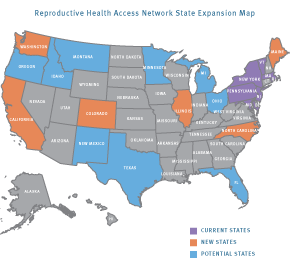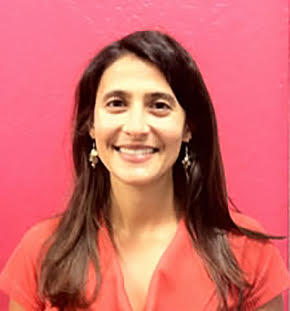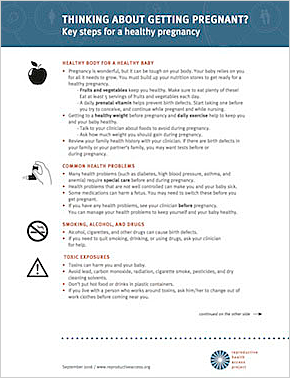Nov 06

Help Us Protect Access to Sexual and Reproductive Health Care Today!
Newsletter/December 2016
 Will you help us expand our Network of pro-choice clinicians?
Will you help us expand our Network of pro-choice clinicians?
The incoming presidential administration poses serious threats to reproductive health and rights. Help us expand our Network to help reach pro-choice clinicians in isolated parts of the country, and in turn they will advocate for, teach, and provide abortion, contraception, and miscarriage care so that everyone can get the care they need.
Since our inception, the Reproductive Health Access Project (RHAP) has been building a strong, vibrant network of pro-choice clinicians. Our Reproductive Health Access Network connects and supports more than 1,100 primary care physicians, nurse practitioners, midwives, and physician assistants across 44 states.
We need your support now more than ever to expand the Network. RHAP has active Networks in seven states and will add six more in the coming months: California, Colorado, Illinois, Maine, North Carolina, and Washington.
Our mission to increase access to reproductive health care by integrating abortion, contraception, and miscarriage care into primary care has never been more important. There is still more work to be done. Donate now and help us connect and mobilize pro-choice clinicians in every state because everyone deserves the right to have access to reproductive care.
“In family medicine, I can offer abortion care to a patient, deliver her baby when she’s ready, and treat her high blood pressure if she needs that. This is what primary care is.”
Kohar Der Simonian
 Dr. Kohar Der Simonian attended medical school at the University of Vermont College of Medicine, where she was first exposed to family medicine. “I liked the continuity of care in family medicine and the idea of treating people throughout their life cycles, from birth to end-of-life care.” In particular, she became interested in reproductive health within family medicine when she first began working with young women. “I realized that most young women really don’t have many health issues other than reproduction. I had the best relationship with young women, and I was well-suited to be that person to discuss birth control and reproductive health care with them. This drove me to seek out more exposure and training.”
Dr. Kohar Der Simonian attended medical school at the University of Vermont College of Medicine, where she was first exposed to family medicine. “I liked the continuity of care in family medicine and the idea of treating people throughout their life cycles, from birth to end-of-life care.” In particular, she became interested in reproductive health within family medicine when she first began working with young women. “I realized that most young women really don’t have many health issues other than reproduction. I had the best relationship with young women, and I was well-suited to be that person to discuss birth control and reproductive health care with them. This drove me to seek out more exposure and training.”
During residency at UCSF, Dr. Der Simonian performed abortions through the TEACH program, where she fell in love with the work. “The interactions that you have with the patients in that ten-minute procedure are so intense and meaningful that they totally encompass the patient-doctor relationship that I wanted.” Following residency, Dr. Der Simonian did the RHAP Reproductive Health and Advocacy Fellowship. “In residency you get so much exposure to everything, but I wanted to become an expert in abortion care—I wanted to spend that extra year learning everything that I possibly could. Without the fellowship, there’s no way I would have had any of the jobs that I’ve had since then. Not only did it give me the clinical skills I needed, but I learned to become an advocate and a teacher of reproductive health. I would have never gotten my dream job as faculty at the UCSF residency. I wouldn’t have my current job without the extra training. Not a day goes by in my regular work that I don’t think, ‘wow, I learned that in my year in New York.’”
Dr. Der Simonian recently moved to Maine, where she is currently core faculty in family medicine at Maine Medical Partners, as well as the medical director of a nearby abortion clinic. She is part of RHAP’s 2016-2017 Miscarriage Care Initiative cohort. “As I was interviewing at the residency, I realized that there was a large gap in training and provision of all reproductive health care–the residency wanted to start offering more reproductive health care, but they just didn’t have a faculty person who was able to train others. The Miscarriage Care Initiative gave us an impetus to get moving on integrating early pregnancy loss care into our residency curriculum and practice sites.”
Moving to Maine from San Francisco was a culture change for Dr. Der Simonian, and the drive behind why she’s helping co-lead the RHAP Network in Maine. “I left behind a well-organized community [in San Francisco] with like-minded people coming together to discuss cases, engage in advocacy, and keep up with current events… I do feel like there’s a lot going on in Maine, but we aren’t necessarily connected and part of that is due to the size of the state. But bringing together providers who do this work will make Maine a stronger place for patients and for other providers who want to do this work, and feel connected.” She also believes that fostering a community of providers will open up opportunities for engagement in advocacy. “I think there are always opportunities for advocacy, [but] individually people don’t realize how much they can advocate for change and get their voices heard. As physicians, we have a powerful voice when we speak and by bringing us together we can ‘rally the troops.’ Alone, it’s hard to stay on top of every measure or law that negatively affects reproductive health. Local Networks are a way to work collectively for change.”
We are so grateful for Dr. Der Simonian’s work, and feel lucky to have her as part of our extended RHAP family!
 Eve Peyser is a writer, comedian, and activist. Her work focuses on relationships and the internet. She is currently the night editor at Gizmodo and her bylines include Gawker, New York Magazine, GQ, and Esquire. Eve is also big fan of the Reproductive Health Access Project. She helped organize our Hyde UnHappy Hour in September – recruiting an amazing line up of comedians and emceeing the event with her comedy partner, Melissa Rocha.
Eve Peyser is a writer, comedian, and activist. Her work focuses on relationships and the internet. She is currently the night editor at Gizmodo and her bylines include Gawker, New York Magazine, GQ, and Esquire. Eve is also big fan of the Reproductive Health Access Project. She helped organize our Hyde UnHappy Hour in September – recruiting an amazing line up of comedians and emceeing the event with her comedy partner, Melissa Rocha.
“Reproductive health access is one of the biggest issues facing our nation—it’s an issue of women’s rights. The work RHAP does in training doctors in abortion, contraceptive, and miscarriage care is essential; I contribute to and fundraise for RHAP because of the organization’s commitment to protecting abortion rights specifically.”
In October, in the days leading up to the election, Eve challenged her Twitter followers to make a donation to a good cause.
“After I hosted RHAP’s annual benefit, the Hyde Unhappy Hour, I noticed on Twitter that many ‘well-meaning’ liberals were donating money to the NC GOP after their headquarters were bombed. Although I don’t condone political violence, I was floored to see progressives donating their money to an organization that has systematically tried to strip the rights of trans and gender nonconforming people. So I challenged liberals on Twitter to match their NC GOP donations with a donation to RHAP.”
She donated to RHAP and tweeted out our donation page. Many of her Twitter followers followed suit and donated to RHAP.
After the election, Eve put the word out about the Reproductive Health Access Project and helped get us listed on Jezebel’s list of organizations to support. Since the election, we have received more than 150 donations from new supporters!
Thank you Eve for using your voice to shine a light on reproductive health, rights, and justice, and for spreading the word about the work we do.
 We are excited to share with you our latest Patient Education resource: Thinking about getting pregnant? Key steps for a healthy pregnancy! This comprehensive, easy-to-read sheet offers information for patients who are thinking of becoming pregnant. In addition to covering healthy eating and exercise, the sheet also answers common patient questions about managing pregnancy with common health problems, vaccinations, toxic exposure, safety, and more. Like all of RHAP’s Patient Education materials, this sheet is easy to read, reflects the latest scientific evidence, and is pharma-free. We have field-tested it with clinicians and are currently field-testing with patients. Check out our preconception sheet in English and Spanish here. It is also available for purchase at the RHAP store.
We are excited to share with you our latest Patient Education resource: Thinking about getting pregnant? Key steps for a healthy pregnancy! This comprehensive, easy-to-read sheet offers information for patients who are thinking of becoming pregnant. In addition to covering healthy eating and exercise, the sheet also answers common patient questions about managing pregnancy with common health problems, vaccinations, toxic exposure, safety, and more. Like all of RHAP’s Patient Education materials, this sheet is easy to read, reflects the latest scientific evidence, and is pharma-free. We have field-tested it with clinicians and are currently field-testing with patients. Check out our preconception sheet in English and Spanish here. It is also available for purchase at the RHAP store.
From now through December 31, 2016, you can get 20% of ALL orders from the RHAP Store. Use discount code: HOLIDAY2016.
 The political landscape for reproductive health care—in the face of the incoming administration and an anti-abortion Congress—will be challenging in the coming months and years. While there is a lot we don’t know for sure, there are some things we do know. We know that there are serious threats to the future of women’s health care and reproductive rights in this country. We know that the Supreme Court will be a battleground. We know that the Affordable Care Act is at risk. We know that our movement will have to have a laser-like focus to win key fights and prevent rolling back 50 years of progress.
The political landscape for reproductive health care—in the face of the incoming administration and an anti-abortion Congress—will be challenging in the coming months and years. While there is a lot we don’t know for sure, there are some things we do know. We know that there are serious threats to the future of women’s health care and reproductive rights in this country. We know that the Supreme Court will be a battleground. We know that the Affordable Care Act is at risk. We know that our movement will have to have a laser-like focus to win key fights and prevent rolling back 50 years of progress.
The Reproductive Health Access Project is strong and doing critical work. We remain committed to our mission of ensuring that everyone has access to reproductive health care by integrating abortion, contraception, and miscarriage into primary care. We are doubling down on our efforts to strengthen and expand our Reproductive Health Access Network – our national network of 1,100+ pro-choice clinician activists. We are investing more time, energy, and resources to connect with and engage clinicians in training and advocacy activities that will support protecting access to reproductive health care. Already, since the election, we have added 50 clinicians to our Network and have started on-the-ground organizing efforts in four new states. We can and will do more. We want to have vibrant, on-the-ground efforts in every state.
We are also working hard to expand our Reproductive Health Care and Advocacy Fellowship. Our one-year fellowship produces highly trained clinician activists who go on to train and provide abortion, contraception, and miscarriage care. The ripple effect of the fellowship is tremendous. Right now, we are training fellows in New York and Boston, and we want to establish more fellowships throughout the country.
The day after the election I awoke determined to roll up my sleeves and do whatever it takes to ensure everyone can access reproductive health care. When I got to work and walked by the health center near our office–the place where I first met Linda Prine and Ruth Lesnewski, the place where the three of us worked so hard to integrate abortion care, the place that serves as a model for all the work we do across the country–I just broke down. But what lifted me up are my colleagues and all the clinicians we work with: we are a strong community that is used to supporting each other to do difficult, challenging work. We will come together to face the many important challenges that lie ahead.
You are part of our community too. We are counting on your support now more than ever. Please get involved in any way you can. Spread the word about our efforts. If you are a pro-choice primary care clinician, join our Reproductive Health Access Network. Make a donation or volunteer to help us continue our work to make reproductive health care accessible to everyone.
Your gift allows us to train and support health care providers across the United States so they can offer patients compassionate and comprehensive care.
Nov 06
